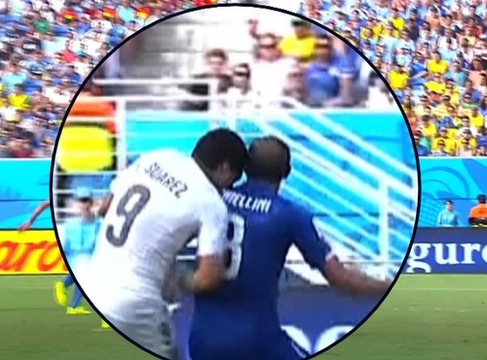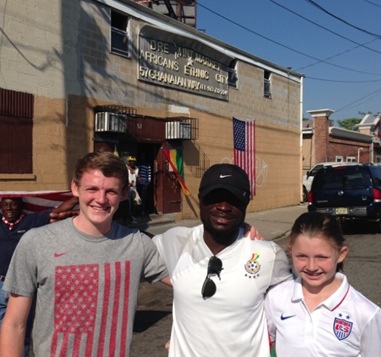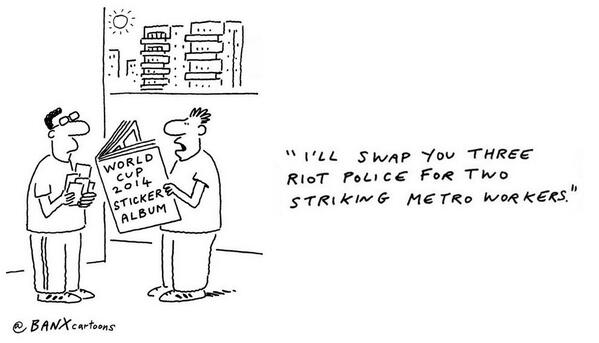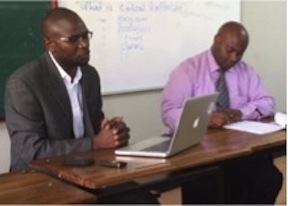
36 hours have passed since millions of Italians watched the national team get eliminated from the World Cup after a 1-0 loss to Uruguay.
Here in Italy, the media and the pundit class have joined ordinary fans in criticizing the team. First in the line of fire is Cesare Prandelli, the coach, rightly taken to task for dubious roster selection, poor match management, improvised tactical changes, and an inability to bind together a group of “senators” (i.e. veterans) and relatively inexperienced youngsters. His resignation in the aftermath of the Uruguay loss, came not a moment too soon for many Italians.
Balotelli, the only player in the squad with potential to be a game-changer, has also come in for plenty of criticism. Reading the papers, watching endless debates on TV, and talking with fans, it appears that many Italians, including vocal defenders of Super Mario, are disappointed with the star striker’s weak performance. Sadly, some racist Italians have taken to the web and social media to insult Balotelli for his blackness.
But I wouldn’t go so far as saying that Balotelli is being blamed for the World Cup debacle. Honest observers recognize that the failure of Italy’s 2014 World Cup campaign has multiple causes, not least the pathetic 0-1 loss to Costa Rica last week. As historian John Foot explained in an excellent column, there is a structural rot in Italian football that needs to be addressed. From corruption and mismanagement to suffering youth systems, club rivalries, and outdated stadiums; the list of major problems is quite long and vexing.
While this analysis is legitimate, there seems to be a consensus among Italians (and not a few neutrals) that the loss to Uruguay was an outright robbery perpetrated against an ordinary team.
The first half of Tuesday’s match was played evenly, with Italy rarely in trouble. Pirlo had a dangerous free kick saved by Muslera and Verratti distinguished himself as the best player on the pitch, weaving in and out of Uruguay’s workman-like midfield with creativity and dynamism. With a draw enough to see the Azzurri through to the next round, Italy was in control.
Then, a few minutes into the second half, the Mexican referee, Rodriguez Moreno, decided the match. In an inexplicably absurd decision, he sent off Marchisio with a straight red card for a normal tackle that showed no malice and, at best, deserved a yellow. What made this refereeing decision so outrageous is that previous Uruguayan fouls of a similar ilk had not been punished with any cards.
Moreno’s call transformed the match. With nearly the entire second half still to play in the heat of Natal, the Azzurri were a man down, less able to deal with fatigue, and psychologically shaken. Uruguay, on the other hand, seized on the opportunity and began dominating the match. Even so, only two goal-scoring chances came out of this advantage.
Perhaps dissatisfied with the outcome of his earlier outrage, Moreno then took center stage again. Suarez, the recidivist, sunk his fangs into Chiellini’s shoulder and then fell to the ground, theatrically, as if felled by a sniper’s bullet. The referee awarded a free kick to Italy, but did not send Suarez off despite Chiellini showing Suarez’s dental mold chiseled into his shoulder area. Surprisingly, the assistant referee provided no assistance.
Two things happened at this point. Instead of playing the final 12 minutes or so 10 vs 10, the Azzurri had to labor on a man down with players cramping and visibly tiring. Then, 100 seconds after the Suarez bite, the Italians lost their concentration defending the corner kick that produced Godin’s winning goal.
Most Italians recognize the 2014 national team was an ordinary one. Fans and pundits admit that Balotelli, Immobile, Cassano, Thiago Motta, De Sciglio and others put in sub-par performances. But people also know a robbery when they see one. And the culprit was Rodriguez Moreno. Curiously, another referee named Moreno (from Ecuador) also sent the Italians home from the 2002 World Cup. He is currently serving a long prison sentence in the United States for smuggling drugs.
Month: June 2014

June 17, 2014
By Tom McCabe*
The text message came through as “URGENT.” Sylvers Owusu, a former student and player, wrote yesterday: “We just received a city permit to block off Ghanaian Way in Newark for today’s GHA vs. USA match. Please join us for a watch party! DJ Albert will provide music to entertain the crowd. Let’s go Ghana!”
The plan was now hatched: first half in Newark, and the second half a few miles away in what has been called “the cradle of American soccer.” I watched several games at the Scots American Club in Kearny in 2010, including the Algeria match punctuated by Donovan’s last-ditch winner. (I also watched Ghana knock the USA out there).
Back at the Scots Club there was a much more joyous celebration to Dempsey’s early strike [click here for video.]
Ten minutes later the Ghanaian congregation began singing a song, unrecognizable to my ears. Sylvers whispered to me: “It’s a gospel song. We need God now.” Ghana grabbed control of the game, but the USA threatened on several occasions to double the lead. It was an intense, physical start to a must-win match.
At the half-time whistle we headed outside and took in the street scenes. DJ Albert had the place jumping and after some dancing and chanting we got back into the car and headed for the Passaic River. Kearny, home to American stars (John Harkes, Tab Ramos, and Tony Meola), the Scots Club, and the second half beckoned.
We arrived ten minutes into the second half as parking was scarce around the Scots Club, but the USA still had that slim one-goal lead. The bar-end of the social club formed in 1932 was packed with people in red, white and blue. “USA” chants rang out as well as repeated frustration about how the Stars and Stripes couldn’t hold on to possession.
After Ghana leveled the score in the 82nd minute it seemed that they would go on to find the winner, but against the flow of the second half John Brooks powered home a precisely-placed Graham Zusi corner. Understandably, there was bedlam inside the Scots Club once again. Hugs, high-fives, chants, and more hugs. It was a major victory in “The Group of Death” that sets up an epic battle against Portugal on Sunday.
*Tom McCabe is an historian at Rutgers University-Newark where he teaches surveys in U.S. History, History of Newark, and History of Soccer. Follow him on Twitter at @tommccabe5. This post was originally published on his new blog Soccer Brains.
Brazil 2014: World Cup Politics
The day before the magic kingdom opens in São Paulo, WKAR’s “Current State” host Mark Bashore interviewed me about the politics of the World Cup. We discussed FIFA profits and institutional reform, special World Cup laws and extraterritoriality, nation-building, development, civic protests, and what the future holds for Brazil, on and off the pitch. Originally broadcast live on June 11, 2014. Take a listen!

World Cup Music: “Afri Can”
An antidote to Shakira and Pitbull!
“Afri Can” is a charity single by Replay GH, a Ghana-based group featuring Zed Ay Kay (Replay GH), Fuji, Farid, and Gustav. It brings together influence from the five African countries that have qualified for the Brazil 2014 World Cup: Ghana, Nigeria, Cameroon, Algeria, and Ivory Coast.
According to the artists, “the different influences, and styles are seamlessly woven together to produce a modern Afro Beats song for the enjoyment of all football and music fans.” To find out more about Afri Can, visit: http://www.outofafricacampaign.com/afri-can/
Zambian Fútbology
 Guest Post by *Hikabwa Chipande
Guest Post by *Hikabwa Chipande
LUSAKA—On June 4, 2014, I was invited by Dr. Walima Kalusa, the University of Zambia’s History Department head, to present a fútbological paper based on my current doctoral research on the political and social history of football in Zambia (1940s-1993). The seminar on “Football and Social Change on the Northern Rhodesian Copperbelt, 1940s to 1960s” was well attended by UNZA History staff, graduate students, and other interested scholars.
I explored how urbanized African miners appropriated football from their European supervisors and, after World War II, created a new black popular culture. When colonial authorities and mining companies introduced post-War social welfare programs to appease miners and urban residents, local Africans used these structures to demand greater access to resources for organized football and other amenities in their communities. In the late 1940s and into the 1950s, Africans popularized the game on the Copperbelt and used it to build vibrant social networks and communities to replace what they left in their rural villages.
As early as 1937, the British had established the Central Native Committee, which seized control of African sport due to fears that the colonized might use football as a tool for political agitation. Despite these moves, ordinary African athletes, officials, and fans developed alternative ways of organizing and enjoying their football. For example, supporters clubs formed. These hard-core fans unexpectedly made club officials and mine managers more accountable to the people. The emerging vernacular fan culture, which no scholar has ever researched before, shows how Zambians were sometimes able to use sport to rework the application of harsh colonial policies.
Another aspect of the history of Zambian football that has eluded researchers has to do with international matches played in colonial times. As I have discovered, Copperbelt teams played in the Belgian Congo, Southern Rhodesia (Zimbabwe), and South Africa. My work illustrates how these sporting adventures, among other things, turned into incubators for Pan-Africanism because the camaraderie experienced by Zambians in these contests sharpened their sense of solidarity with fellow Africans in neighboring colonies.
 Alexandra Wrage, a Canadian attorney and founder of TRACE International, a business anti-corruption group, was interviewed by BBC Newsnight about the ongoing FIFA corruption scandal over Qatar’s successful bid to host the 2022 World Cup.
Alexandra Wrage, a Canadian attorney and founder of TRACE International, a business anti-corruption group, was interviewed by BBC Newsnight about the ongoing FIFA corruption scandal over Qatar’s successful bid to host the 2022 World Cup.
Wrage worked for FIFA’s governance reform commission from 2011 to 2013. In April 2013 she told the Wall Street Journal “that the FIFA executive committee ‘undermined the recommendations we were making’at almost every turn.” She resigned because “you don’t keep doing the same thing if you’re not having an impact.”
Wrage believes change is more likely to come if Swiss law regulates locally based non-profits like FIFA (sic!) more effectively and, perhaps, if a groundswell of popular criticism can compel corporate sponsors to take action.
Click here to watch the 4-minute interview.